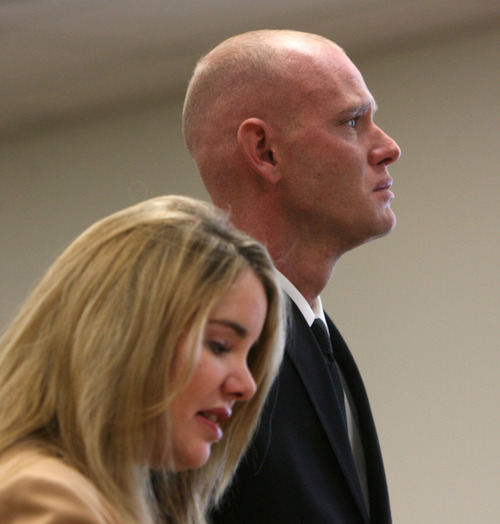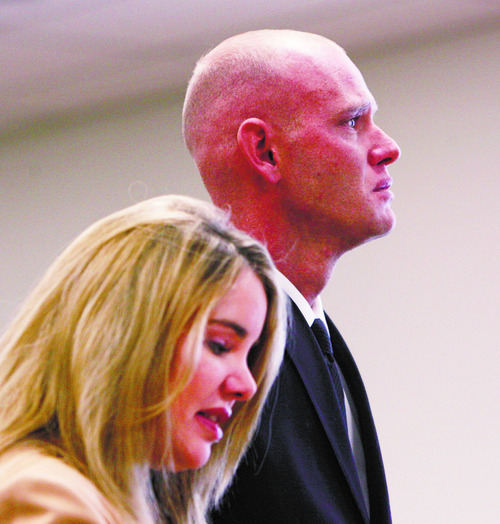This is an archived article that was published on sltrib.com in 2013, and information in the article may be outdated. It is provided only for personal research purposes and may not be reprinted.
Nephi » At the beginning of every presentation, Eric Charlton tells his audience that he lived a seemingly perfect life prior to May 28, 2012. He was no criminal — in fact, he served in the Marines and did a tour in Iraq. He was beginning to settle down and had started a family with his wife. Life was good.
But then Charlton tells the audience — which, depending on the day, could be filled with junior high school students, at-risk youths or recovering substance abusers — how his life turned upside-down when he unintentionally shot and killed his teenage brother while under the influence of alcohol at a campsite near Yuba Lake.
Charlton said he wasn't drunk that night, but he had been "sipping" on a few alcoholic drinks. He sat around the campfire with his brother, 17-year-old Cameron Charlton, and the teen's friend, Jonathan Hummel.
Hummel testified in September that the group had been telling ghost stories around the campfire and became spooked when they heard coyotes in the distance. The older Charlton grabbed his .45-caliber handgun.
Charlton swung his arm across his body and told his younger brother, "You know you're my brother when you can trust me with this," Hummel testified. The gun fired, and a bullet passed through Cameron's left temple.
Charlton told police he couldn't remember how the gun went off, and could not remember charging the gun's chamber with a live round.
In a Tuesday interview with the The Salt Lake Tribune, Charlton said that moments before the shooting, he was talking to his brother about his future.
"I was telling him how much I loved him," he said. "And how much I wanted for him in life. And then it happened, and he died in my arms... I have those images every day. Every night when I go to sleep. The sounds of it, the horror of it."
After Cameron's death, Charlton had an added stress when criminal charges were filed against him. Prosecutors originally charged the 28-year-old Weber County man with second-degree felony manslaughter. But after a preliminary hearing, 4th District Judge James Brady reduced the count to a class A misdemeanor.
In October, Charlton pleaded guilty to a class A misdemeanor count of negligent homicide and a class B misdemeanor count of carrying a weapon while under the influence of alcohol, and in January, Brady ordered Charlton to serve six months in jail.
But Charlton asked for a unique opportunity: to tell his story to kids and young adults, in an effort to deter them from making similar mistakes by mixing alcohol and guns. Brady granted the request, in part, ordering Charlton to serve 90 days in the Juab County jail and to make 90 presentations by Tuesday.
But during Tuesday's review hearing, defense attorney Susanne Gustin said Charlton had fallen short, having completed only 45 presentations. Gustin asked for more time, adding that Charlton's therapists are concerned with the presentations, because he is re-living the shooting every time he tells the story, and is not progressing as he should in therapy.
Brady extended the deadline to complete the other 45 presentations to the end of the year, but he also gave Charlton the option of returning to jail for an additional 45 days. But Charlton said he is committed to telling his story because jail would be too easy.
"I would rather stick out the pain and heartache to help people and fulfill my obligation to the court," Charlton told The Tribune. "Going back to jail is the easy way out."
Every time Charlton tells the story of what happened last May, it is like ripping open a wound that has never had a chance to properly heal. But most difficult, he said, is realizing that to many people, Cameron is just a story, or a criminal case. The people who hear his story don't know who Cameron was as a person. They don't have the memories that Charlton has of fishing with Cameron and his dad, or of Cameron breaking his arm when he fell off a counter when he was a toddler.
"Cameron was a person," Charlton said tearfully. "But anytime I have to talk about him, it's not about Cameron, it's about this situation."
Charlton said that after his presentations — which he said almost always end with him "bawling" — many from the audience want to comfort him, give him hugs, offer their condolences.
Even after Charlton completes the final 45 additional presentations, he said he will continue telling his story, in hopes that it might reach at least one more kid who could learn from Charlton's mistakes. He said he hopes parents will also share his story with their children.
"I want parents to pull those stories [in the media] up, sit their kids down and let them watch, let them see," he said. "My tears aren't fake. It's genuine hurt. I want kids to look at that , and maybe use it down the road."
Twitter: @jm_miller





